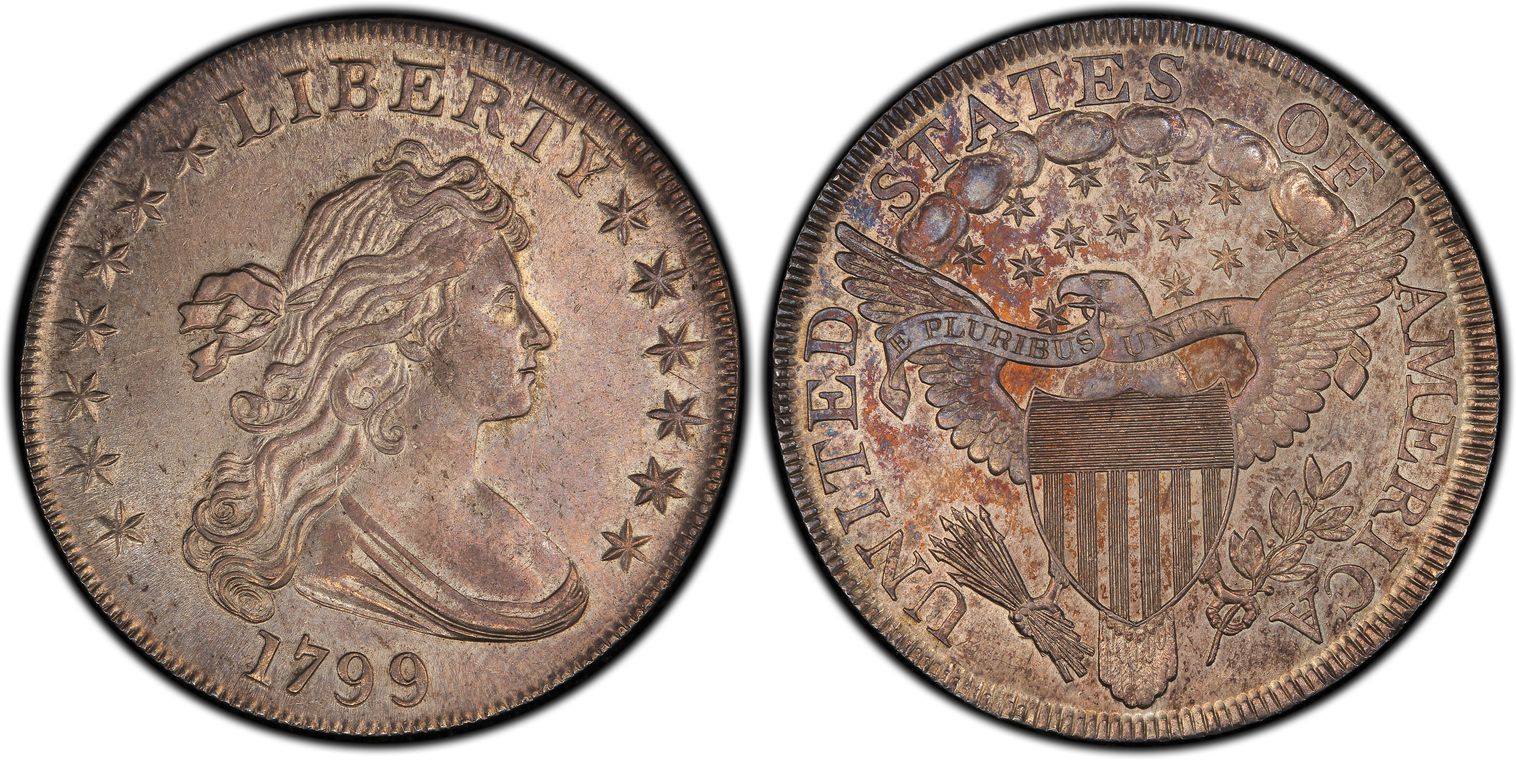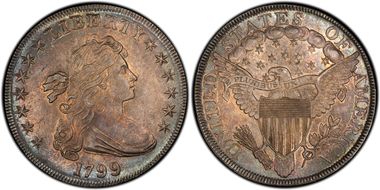1799 $1 BB-162 AU58 认证号27942533, PCGS号40053
专家评论
Q. David Bowers
The following narrative, with minor editing, is from my "Silver Dollars & Trade Dollars of the United States: A Complete Encyclopedia" (Wolfeboro, NH: Bowers and Merena Galleries, Inc., 1993). Note: the Notable Specimens list should be used with caution - it has been updated in my 2013 edition of "The Encyclopedia of United States Silver Dollars 1794-1804."Bolender 6, Haseltine 6.
OBVERSE 4: See description under 1799 BB-156. The Bolender Collection. specimen shows a slight crack along border opposite point of bust. Usually found weak at the centers. In BB-157 and BB-162 the upper right corner is slightly indented in the 1 in date.
Obverse die used to strike 1799 BB-156 (with clash marks), BB-157, BB-161 (now relapped), BB-162, BB-163, and BB-164.
REVERSE J: A in STATES touches clouds. Far right edge of A is over cloud 3, Leaf points to center of upright of I in AMERICA. Letter A touches both 3rd and 4th feathers. Point of star 'touches lower part of eagle's beak; ray points to left upright of U, slightly to the left of its center. Upper stars about same as BB-157, except that the second star from the left has two points touching clouds. A very dose to M, ME joined at lower part. The letters in E PLURIBUS UNUM seem larger and in some instances differently proportioned on this reverse (and also that of BB-164, from a different die).
Reverse die used to strike 1799 BB-162 only.
DIE STATES:
Die State I: Obverse die with slight crack along border opposite bust. Perfect reverse die.
Die State II: Later obverse state with an obverse crack at the bust point through the last four stars to the rim.
Die State III: Obverse as preceding. Reverse with crack from rim to doud7. Crack through OF to wing. Crack from bottom left of R through field to leaf. The die state usually seen.
Die State IV: Obverse as preceding. Reverse with additional crack, from ED, through wing, through STATES, to border. Scarce die state.
Die states of this and the next indicate an interrupted striking of these two, or, BB-163 was struck before BB-1621
COLLECTING NOTES: 1799 BB-162 is of medium scarcity. I believe that 300 to 500 survive. In his 1881 Type-Table, J.W. Haseltine called this variety very scarce, Most specimens are in circulated grades through VF, with an occasional EF and even more occasional AU appearing on the market. Nearly a dozen Uncirculated coins have appeared on the market in recent decades, but most were not recent enough (since 1986) to be graded by today's more stringent interpretations. Thus, the net number of Mint State coins is less than the auction data indicate.
NOTABLE SPECIMENS:
Chalkley Specimen, MS-63. Superior, Chalkley Collection Sale, 1990:2863. "Light golden toning on the obverse with deeper multicolored toning on the reverse. A few contact marks, a tiny test mark on the rim above T of LIBERTY and a pair of pin pricks at the left ribbon and on the reverse. Struck from a rusted reverse die."
Clarke Specimen. MS-60. Col. E.H.R. Green Collection. Netherlands 48th Sale, T. James Clarke Collection, 1956:630. "Lightly toned Unc. Almost perfectly centered; better struck up than most. The only pronounced die weakness is upon the reverse ribbon at.UNUM and the inside of the eagle's left wing. Obverse cracked through last four stars to bust as on Bolender-10a, Bolender-17. Reverse rusted in left field; cracked from edge between S and OF to cloud, through OF and wing, and edge to MER to branch."
Cornell University Specimen. MS-60 •• Stack's, Cornell University Collection Sale, 1975:910. "Brilliant Unc. Full lustre and 'cartwheel' effect, and attractive toning. Bold reverse with sharp denticles. A touch of friction on the high points from the choice category. Beautiful and attractive."
Hollinbeck-Kagin Specimen. MS-60. Hollinbeck-Kagin Sale, June 1970:622. "Brilliant slightly golden Unc., reverse prooflike."
Low-Bolender Specimen. MS-60. Lyman H. Low sale 1918. M.H. Bolender Collection, 1952:93. "Unc., but a few file marks on reverse done at mint to adjust weight of planchet before striking, and usual weakness at UNUM on ribbon. Attractive color and mint lustre." K.P. Austin Collection, Lester Merkin, AJ. Ostheimer, 3rd Collection, 1968: 277. "Iridescently toned choice Unc. Faint reverse adjustment marks; almost free of bagmarks. Unusually bold strike." Superior Galleries, Gilhousen Collection, 1973:1251. "Warmly toned Une., sharp except in centers (where adjustment marks show on reverse); minute rim nicks." Superior Galleries, ANA Convention Sale, 1975: 919. "Cracked reverse. Warmly toned Unc., sharp except in centers (where adjustment marks show on reverse); minute rim nicks."
Eastern Collection coin. MS-60. Coin in a private eastern collection, Uncirculated. May duplicate another listing. (Reported by Douglas Winter.)
CSNA-Bolender Specimen. AU-55. From the convention sale of the California State Numismatic Association in Santa Cruz (1951). M.H. Bolender Collection, 1952:94. "Unc., magnificent sharp even impressions. Highest portions of eagle on reverse are very slightly rubbed. Nearly full mint lustre."
DeCoppet Specimen, AU-55. James Kelly, Andre DeCoppet Collection, 1955. "Practically Unc., well struck."
DeCoppet Specimen (another). AU-55. James Kelly, Andre DeCoppet Collection, 1955. "Another very rare variety with heavy die break on reverse. Practically Unc."
PCGS #
40053
设计师
Robert Scot
边缘
Lettered: HUNDRED CENTS ONE DOLLAR OR UNIT
直径
40.00 毫米
重量
27.00 克
铸币数量
423515
金属成分
90% Silver, 10% Copper
更高评级数量
3
评级较低的钱币数量
10
地区
The United States of America
价格指南
PCGS 数量报告
拍卖 - PCGS 评级的
拍卖 - NGC 评级的























